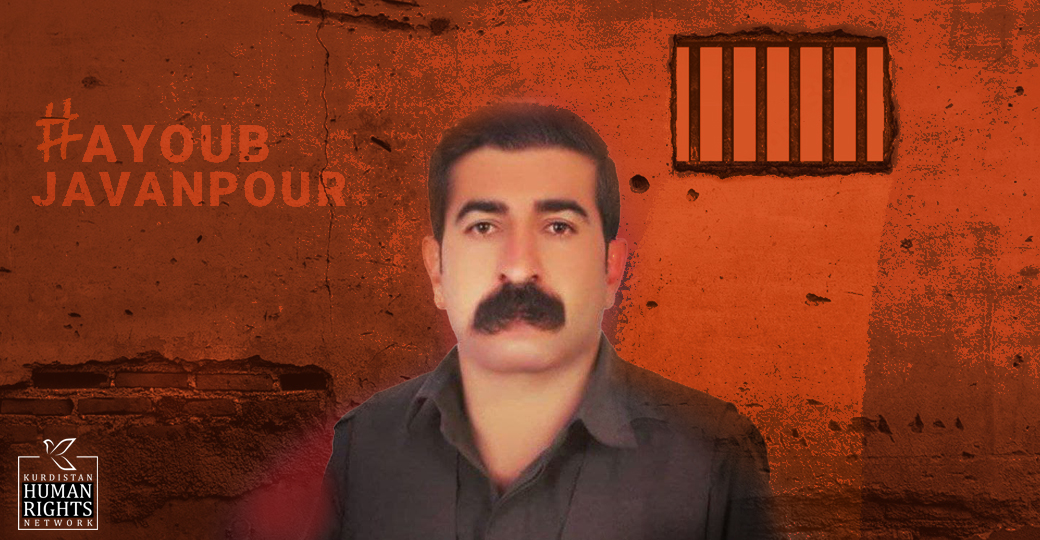In recent years, Ayoub Javanpour has worked as a labourer and kolbar. He was once injured in his leg after falling from a height during a chase by Iranian border forces on a kolbar route.
Previously, in October 2017, he was arrested for participating in demonstrations supporting the Kurdish independence referendum and was later released on bail.
The Islamic Revolutionary Court of Saqqez, Kurdistan Province, initially sentenced him to a fine of 18 million rials and 50 lashes in public on charges of “disrupting national security”, but he was eventually acquitted and the sentence was annulled.
Arrest
Javanpour was arrested during the anti-government uprising of Women, Life, Freedom on 25 September 2022 and was later released on bail.
He was beaten and arrested again without a warrant by security forces on 10 June 2023 at his family home in Saqqez.
During his detention at a security detention centre in Sanandaj, Kurdistan Province, he was severely tortured, and his family had no information about his whereabouts for a month.
On 16 July 2023, he was imprisoned in Saqqez Prison.
Judicial Process
On 22 July 2023, Branch One of the Islamic Revolutionary Court of Saqqez, presided over by Judge Keyvan Jahani, sentenced him to 10 years in prison on charges of “leading a group of more than two people inside the country with the aim of disrupting national security”, to one year in prison for “propaganda against the state by lowering the flag of the Islamic Republic of Iran”, to two years for “insulting the leader”, and to two years in prison for “insulting the founder of the Islamic Republic of Iran”, totalling 15 years of imprisonment.
According to Article 134 of the Islamic Penal Code and Article 12 of the Law on Reducing Imprisonment Sentences, his sentences were combined, and the most severe sentence, 10 years in prison, was to be served, which was later reduced to three years in the appeal court.
In another case in December 2023, he was sentenced to one year of imprisonment and 15 months of exile to Bavi, Khuzestan Province, by the Islamic Revolutionary Court of Saqqez, presided over by Judge Javad Mostafaei, on charges of “propaganda against the state”.
Current Status
Javanpour is currently being held in Saqqez Central Prison.
Additional Information
– On 30 January 2024, he went on a hunger strike in protest against the execution of four Kurdish political prisoners Vafa Azarbar, Mohsen Mazloum, Pezhman Fattahi, and Mohammad Faramarzi, in Saqqez Central Prison.
– In March 2024, he was placed in solitary confinement for one week.
Notes:
1. Women, Life, Freedom Uprising: Jina Amini (Mahsa Amini), a 21-year-old Kurdish woman from Saqqez, Kurdistan Province, was arrested on a street in Tehran on 13 September 2022 by the morality police because of the way she was dressed. Shortly after her arrest, she was transferred to Kasra Hospital in Tehran with head injuries and symptoms of brain death, and passed away three days later on 16 September 2022. The government’s killing of Jina sparked unprecedented anti-government protests, which began with a large turnout at her funeral at Aichi Cemetery in Saqqez and quickly spread to many cities across Iran. These widespread protests against the Islamic Republic of Iran, which lasted for several months, resulted in at least 527 protesters being killed and thousands injured and arrested. The protests are known for their central slogan of “Women, Life, Freedom” (Kurdish: Jin, Jiyan, Azadi).
2. Article 489 of the Islamic Penal Code: “Anyone who, with any belief, forms or leads a group, organisation, or branch consisting of more than two people, whether inside or outside the country, under any name or title, with the aim of disrupting national security, and is not recognized as a mohareb (enemy of God), shall be sentenced to imprisonment for a period of two to 10 years.”
3. Article 500 of the Islamic Penal Code: “Anyone who engages in propaganda activities against the Islamic Republic of Iran or in favour of groups and organisations opposing the state, in any manner, shall be sentenced to imprisonment for a period of three months to one year.”
4. Article 514 of the Islamic Penal Code (Deterrent Punishments and Penalties): “Anyone who insults the Founder of the Islamic Republic or the Leader in any manner shall be sentenced to imprisonment ranging from six months to two years.”
5. Article 134 of the Islamic Penal Code: “In the case of multiple crimes, only the most severe punishment mentioned in the verdict is enforceable, and the other punishments are not considered unless the most severe punishment is reduced or converted for a legal reason, such as the private plaintiff’s withdrawal of his complaint, the annulment of the legal punishment, or the passage of time, in which case the next most severe punishment will be implemented.”


